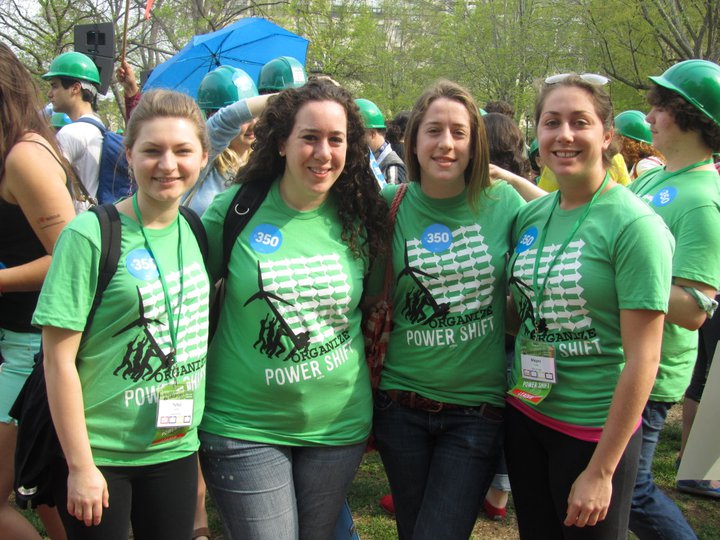Wednesday, May 18, 2011
Rider students joined more than 10,000 of their peers as they converged on Washington, D.C., in April for Power Shift 2011, hoping to lay the groundwork for a systemic change in the world’s energy consumption.
by Sean Ramsden
As a cultural movement, Earth Day has gained a foothold in the collective consciousness of Americans, but the nation’s environmental policies of the future are still going to be determined in Washington, D.C. In that sense, then, it wasn’t surprising to see some 10,000 college students, including a number from Rider, converge on the capital in April for Power Shift 2011, to lay the groundwork for a systemic change in the world’s energy consumption.
Created and organized by the Energy Action Coalition, Power Shift 2011 billed itself as a “boot camp” that aimed to train committed attendees to build the ground force for clean technology growth and job creation; transform higher-education campuses into the innovation hubs for a clean-energy society; and campaign for the rights of every community to have access to clean air and water, healthy food, and for an Environmental Protection Agency that is “allowed to do its job,” according to https://powershift.org/.
Among the speakers present to rally the conscientious students were former Vice President Al Gore and Van Jones, co-founder of Green for All, both of whom are considered among the sustainability movement’s preeminent voices. In his remarks, Gore told students that the cultural shifts required to effect environmental change happen slowly, but can be observed more easily by comparing generational outlooks.
For instance, in comparing the sustainability movement to the Civil Rights Movement of the 1960s, Gore said that young people often try to explain to their parents or grandparents how current environmental policy is outmoded and needs to change. He said that the children of today’s students will judge such policy akin to how current students view things concepts like legalized segregation, hardly able to believe it was once the standard.
Dr. Michael Brogan, assistant professor of Political Science, said the Rider students who trekked to Washington for Power Shift 2011 benefited from the experience in a number of ways.
“It was an outstanding networking opportunity for like-minded students, and it illustrated activism in action,” said Brogan, who accompanied the Rider attendees, composed of Eco-Reps and students from Sustainable Rider, as a faculty adviser. “It was a great example of collective leadership and working to effect change using a bottom-up approach.”
The Eco-Reps and students from Sustainable Rider had their trips funded by the Energy and Sustainability Steering Committee (ESSC) and SGA, respectively, according to Melissa Greenberg, Rider’s sustainability coordination manager. All students agreed that, regardless of their majors or career plans, Power Shift was a worthwhile and enlightening experience.
“I was pleasantly surprised to learn about how sustainability can be presented to different clubs and people,” said Yuliya Labko, a Biology major who was in attendance. “Many individuals think that sustainability is one-sided and has nothing to do with them; however, the issues of pollution affect our health, economy and social justice.”
Labko says that environmental issues transcend science, also creating an impact on socio-economic issues and business, too.
“I discovered Weatherize D.C., a project in Washington, in which they go to lower socioeconomic areas and to help make houses there more energy efficient, so the residents pay less for their energy,” Labko said. “I also learned that New Jersey is the number one state in the country in terms of solar power generation. All of these things are a great example of prospects for future business leaders in the green-jobs field. They are innovative and bring substantial profit.”
Environmental Science major Nina Joffe was impressed by Gore’s message, particularly his emphasis of the role young people must play in the movement.
“He put a lot of emphasis on the necessity of grassroots organizations and the youth of America, making connections to the ’60s, when the average age of NASA scientists at the time of the moon landing was 26,” Joffe said. “The environmental challenge we face today is on the same playing field as the space race was 50 years ago, only this time we have more creativity, more knowledge, more technology and a bigger movement.”
Joffe added that it’s not unusual for young environmental activists to feel discouraged from time to time due to perceived apathy among the larger public, but she returned from Power Shift energized about the future.
“Attending Power Shift gave a sense of hope, in that there are a significant number of people in the country who are just as passionate about a clean energy economy and a sustainable future for humanity,” she said. “Simply knowing about environmental issues isn't enough; it takes more than just knowledge to induce change. Attending Power Shift was a way for me to take a stand.”

